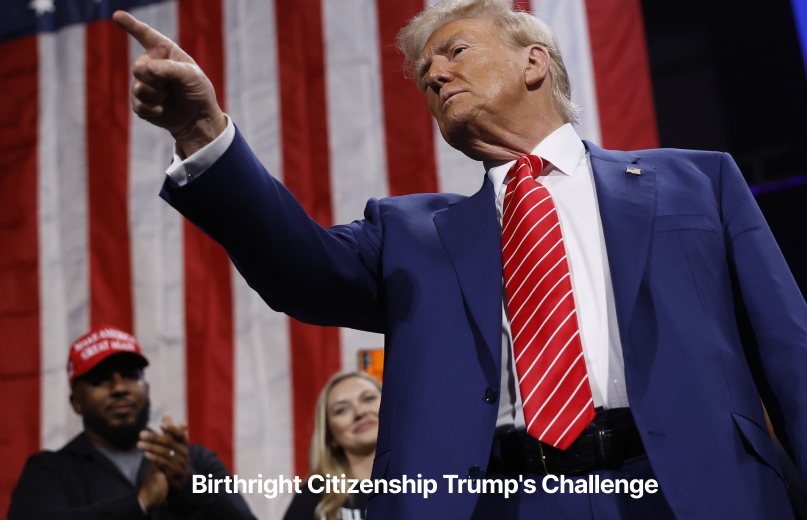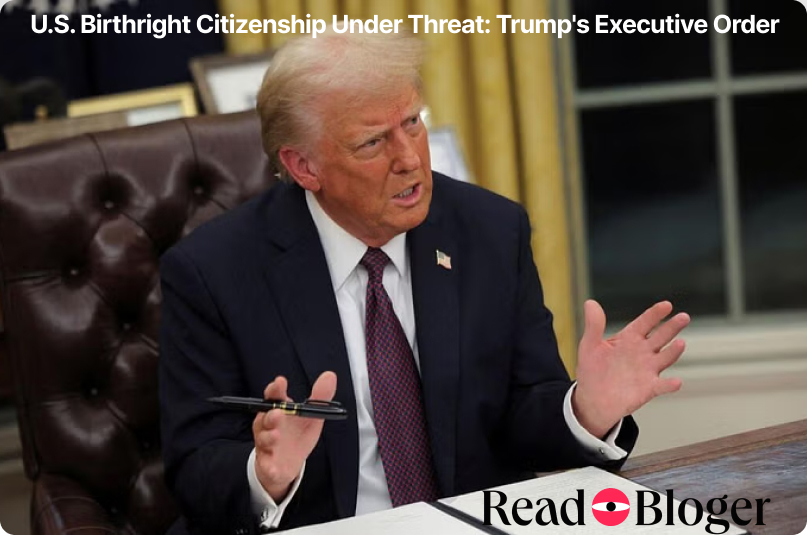Birthright Citizenship Trump’s Challenge
The concept of U.S. birthright citizenship, rooted in the 14th Amendment of the Constitution, guarantees that all individuals born on U.S. soil are automatically granted citizenship. This longstanding principle has been a defining feature of American identity. However, a controversial move by U.S. President Donald Trump during the opening hours of his second term has sparked outrage and debate across the nation. On January 20, 2025, Trump signed an executive order seeking to end automatic citizenship for children born to undocumented immigrants and even some lawful, temporary immigrants.
This move has significant implications, not only for illegal immigrants but also for students and professionals from India and other countries who come to the U.S. on temporary visas. The order, set to take effect on February 19, 2025, is a direct challenge to the 14th Amendment’s provisions and has drawn criticism from lawmakers, legal experts, and immigrant communities alike.

What the Executive Order Entails
The executive order declares that children born in the U.S. to undocumented immigrants or those on temporary visas, such as H-1B, H-2B, student, or tourist visas, will no longer receive automatic citizenship. According to Trump, these children are not “subject to the jurisdiction” of the United States and thus do not qualify under the 14th Amendment’s birthright citizenship clause.
Indian-American Congressman Ro Khanna condemned the order, stating, “Trump’s order removes birthright citizenship for children born in the U.S. not just to undocumented parents but to ‘lawful’ immigrants who are temporarily on a student visa, H1B/H2B visa, or business visa. So much for the pretense that the Republicans are for legal immigration.”
Impact on Indian Professionals and Students
For Indian professionals and students, who make up a sizable portion of the immigrant community in the United States, this decision is very troubling. With more than 650,000 granted each year, Indians are the main recipients of H-1B visas, with an extra 20,000 going to students studying in the United States. Given how much American computer companies depend on highly qualified Indian workers, these visas are essential.
The executive order creates uncertainty for these professionals by denying birthright citizenship to their children, which deters talented individuals from choosing the United States as a destination.
Opposition from Indian-American Lawmakers
Indian-American lawmakers have united in opposition to the executive order. Congressman Shri Thanedar expressed his firm stance, stating, “No matter what Donald Trump says or does, birthright citizenship has and will be the law of the land. I will fight to protect it at all costs.”
Similarly, Congresswoman Pramila Jayapal criticized the order as unconstitutional, adding, “Plain and simple, this is unconstitutional and cannot be done with the stroke of a pen. If enacted, it would make a mockery of our country’s laws and the precedents set in the Constitution.”
As legal battles unfold, the fate of this executive order will likely shape the future of immigration policy and the interpretation of the 14th Amendment. Regardless of the outcome, the debate underscores the importance of upholding constitutional principles and ensuring fairness for all who contribute to the nation’s success. read about this more latest news.
Legal Challenges and Broader Implications
Numerous legal challenges have already been made to the executive order. 22 state attorneys general have sued to halt the order, claiming that the constitutional guarantee of birthright citizenship cannot be changed by the president or Congress. While additional states have filed a separate case in the Western District of Washington, 18 states and two cities—San Francisco and Washington, DC—have challenged the order in the Federal District Court in Massachusetts.
According to legal scholars, the 14th Amendment guarantees birthright citizenship automatically and cannot be changed by executive decree. The importance of defending the rights of everyone born in the United States has been emphasized by the involvement of immigrant rights organizations in the legal battle.
Conclusion
The executive order targeting U.S. birthright citizenship represents a fundamental shift in American immigration policy and has far-reaching consequences for immigrants, especially Indian professionals and students. By removing automatic citizenship for children born to temporary visa holders, the order could deter skilled talent from coming to the U.S. and weaken the nation’s global competitiveness.



